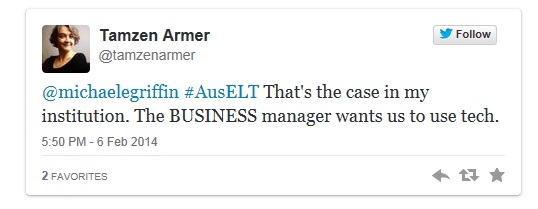This is the second in a series on 4 blog posts summarising the many issues that were raised in the recent #AusELT chat with Scott Thornbury on the subject of edtech in ELT. The title quote is a comment made by @eslkazzyb during the beginning of the discussion. References or links have been included as far as possible but let us know if we need to make corrections or additions.
@Eslkazzyb gave us a neat summary of the different attitudes towards the use of edtech in our #AusELT community. The ‘hype’ is the technoevangelism – the idea that you have to use tech in ELT because it is ‘better’ and that means, whether you like it or not, you should embrace it and incorporate its use in your lesson planning. This is definitely an idea that has frustrated and annoyed a lot of teachers.
Then there’s the ‘hope’. Edtech has its supporters too – some are approaching it cautiously, beginning to see benefits where before they saw none, gradually coming around to the idea that there might be some scope for the inclusion of tech in the language learning classroom.
Others (the technovores!) are the early-adopters. Not necessarily technoevangelists, they are the daily users, those who have fully integrated edtech into their daily teaching, manage to get the right blend for their blended learning and appreciate the advantages that it brings, while acknowledging that there can sometimes be a downside. These people already have an idea of ‘what we are actually meant to do with it all’.
HYPE
There is a push to use edtech but it isn’t necessarily coming from educators. There were suggestions that blended learning is driven by publishers and corporate training/e-learning (@ElkySmith), by sales and marketing (@tamzenarmer, @Penultimate_K), and that there is a perception that this is something that the learners want – students are meant to be motivated by tech so we’ll sell them tech!
@thornburyscott stated that ‘we need to be suspicious of technology when it is being co-opted by multinationals to commodify education for profit, as in the US.’ This need for suspicion extends to directives that we ‘must use tech’ or ‘tech improves teaching/learning’ with @harrisonmike making the point that we should show the quote below to anyone who tells us this is so:
@Penultimate_K mentioned that it seems that often the choices we are meant to be making when it involves tech have been curated for us and there are ‘so many lists of what we’re meant to do/need.’ You don’t need to look very far to find ‘The Top 10 Apps to Use in Class’ or ‘7 Effective Ways to Teach Language with iPads’ and, of course, this leads to a ‘race for money’ (@trylingual) by the developers of those apps and the makers of those iPads, and along the way the need for those tech tools to be pedagogically sound is lost.
@thornburyscott supported this idea as tech being the driver rather than the tool with this 2003 quote from Diane Laurillard:
“Technological innovation is driven by many factors, but not one of them concerns a pedagogical imperative.”
And the results of the hype? Confusion and frustration. The decision to use edtech or not, to believe in its advantages or not, can divide teachers (@Eslkazzyb). Both @ChristineMulla and @roboloughlin mentioned the sense of demoralisation that teachers experience when you don’t live up to the expectations to use tech. In some cases, teachers can even be penalised for not including tech with @harrisonmike commenting that Ofsted (the UK Office for Standards in Education, Children’s Services and Skills) will not grade a teacher as ‘outstanding’ if tech is not used. This also brings us back to the problem of where the expectations are coming from: from accrediting bodies such as Ofsted, from students, from managers, or from sales? If you don’t make the effort to use tech, then who exactly are you disappointing? @thornburyscott commented that ‘teachers are often blamed for not instituting tech, but maybe they don’t see the need?’ and too often this blame is coming from technoevangelists who ‘lose sight of the learners and the learning’ (@ElkySmith) and who may not even be teachers.
The pressure to use tech can often be seen in institutions with blended learning courses, where teachers feel an obligation to use, for example, the Interactive Whiteboard, just because it is there or just because content has been developed for it. This can result in reduced teaching quality when the focus becomes ‘having to use the IWB’ rather than the learning objectives. There can also be avoidance, ‘When we got IWBs, teachers wanted to use them just for effect. Many just avoided them and used the WB’ (@MerMac) and use that has no real pedagogical benefit, ‘often only use IWB to display IWB notebooks of Word documents – and to project the Internet.’
HOPE
‘It is easy to feel that the edtech tide is going out and you’re getting stranded’ (@ElkySmith) but there is hope for those who are feeling somewhat left behind. @trylingual asked ‘Can teachers change this? Are we responsible?’ and the answers seem to be ‘yes’ and ‘yes’.
If we take @ElkySmith’s view and consider technology ‘equal alongside all [the] other methodological technologies’ then it becomes a slightly less daunting prospect. It isn’t ‘a silver bullet’ (@Shaunwilden) but another tool to add to a teacher’s repertoire. The fact is that rarely do teachers use edtech wholesale.
While the plethora of edtech (the tools, the apps, the sites, the techniques) can be daunting, the majority of teachers are working to get past this and see the potential. It’s the difference between not writing off IWBs because you’ve been pushed into using them but also not writing off IWBs because you don’t know how to use them effectively (@SophiaKhan4 and @thesmylers).
And let’s not forget the students in all this. @thesmylers asked about what the students expect and @Eslkazzyb commented that she hadn’t seen the demand for the use of edtech that she had anticipated, which made her wonder about how much impact its use has on engagement and motivation. If this demand has been exaggerated, then the onus is off teachers to provide tech-centred lessons all day every day, and return to a pedagogically-focused class with tech as just one tool among many at the teacher’s disposal.
WHAT ARE WE ACTUALLY MEANT TO DO WITH IT ALL???
@mattellman pointed out that yes, there might be hype and hope, but there is no actual evidence of disappointment and that learners have a lot more access to English now via edtech. Technofundamentalism is not restricted to the sphere of ELT – it ‘pervades all sectors of society’ (@english_safari) and there are many who feel there are benefits to be gained from it while maintaining a balanced perspective.
The teachers who feel the most hope seem to be those who have been able to harness the tech as a tool rather than a driver and who perceive the use of tech in ELT as augmented learning rather than blended learning (@Innov8rEduc8r & @forstersensei)
Augmented learning can be implemented either by teachers or tech developers or a combination of the two. The teachers will look for pedagogically sound applications (@ElkySmith) and the developers will create ‘tech specifically designed for ed rather than tech which could be used for ed’ (@Penultimate_K) or as @forstersensei put it, ‘don’t sell tech, sell education and let tech be incorporated.’
@lukeealexander pointed out the liberating effect of using free tools (‘if you know where to look’) and also commented that he perceived tech ‘as a site of contestation rather than (a) monolithic force for neoliberalism.’ Tech can be time-saving or let you expedite the exposition stage, freeing teachers up to engage more with students. Tech can bring breadth to your lesson content.
@innov8torEduc8tor summed up the balanced approach best with this idea:
References
Coffield, F. & Edward, S. (2009). Rolling out ‘good’, ‘best’, and ‘excellent’ practice. What next? Perfect practice? British Educational Research Journal, 35 (3), June, pp. 371-390. Retrieved from http://teambath.bath.ac.uk/education/documents/seminars/ORE_Reading_Group_01.07.13.pdf
Laurillard, D. (2002). Rethinking University Teaching: A Conversational Framework for the Effective Use of Learning Technologies (2nd ed). London: Routledge/Falmer.
McCann, U. (2008). Universal McCann Social Media Tracker Wave 3. Universal McCann, New York. Retrieved from http://www.universalmccann.com/Assets/2413%20-%20Wave%203%20complete%20document%20AW%203_20080418124523.pdf
Postman, N. (1993).Of Luddites, Learning, and Life. Technos Quarterly, 2(4). Retrieved from http://www.ait.net/technos/tq_02/4postman.php
This summary by @Penultimate_K



